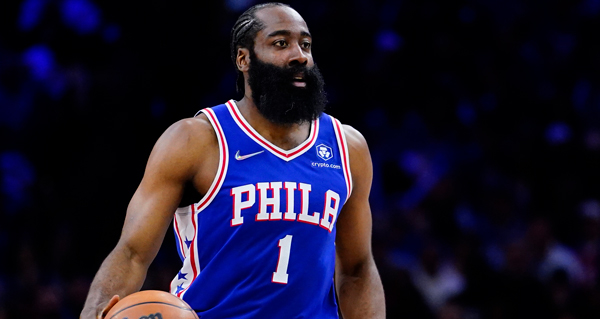James Harden has a real-life problem. He hates his boss, doesn’t get paid enough and wants to change jobs. But he can’t.
Instead, he’s stuck at his crummy job as the starting point guard for the Philadelphia 76ers, where he’s making a lousy $35.6 million a year and playing for a boss who, according to Harden, is a liar. Inflation has been rough on many Americans, but none as much as Harden.
I’m being facetious, but there is a point here: What happens when an unhappy star demands a trade, but there’s no market for him?
Harden has been traded once, twice, three times already, but each time there was a frothy market for the one-man scoring machine. But this time is different. Now he’s 33, good (maybe even very good) but no longer in his prime. There was a time when Harden was good enough to buoy your title hopes, but he’s not that guy anymore. We’ve seen stars demand trades in the past, but this is the first time we’ve seen a star demand a trade at the exact moment when his internal belief of who he is has yet to catch up with league-wide perception.
Let’s take a look at the last few stars to get moved: Kevin Durant, still a top-10 player and the Nets got a commensurate return; Kyrie Irving, a skilled scorer but is 31, unreliable and, because of that, didn’t sign this summer for the max amount of years; Donovan Mitchell, ascending All-Star that yielded a healthy haul for his former team last year.
Somewhere in his mind, Harden does know the market for him has changed. It’s why rumors of joining the Houston Rockets as a free agent started at Christmas, just a few months after Harden accepted a pay cut with the 76ers. Harden knew he needed to create a bidding war to drive up his value.
But then the Rockets chose Fred VanVleet over him, and Harden chose to opt into his contract rather than test the market as a free agent. It’s easy to understand why: The teams he wanted to play for didn’t have the cap space to give Harden the contract he wanted. But maybe there was also some hesitancy to actually test the open market. A test could have yielded unwanted results, and sometimes ignorance is more desirable than hard truth.
So Harden opted in, trusting the only thing he knew for certain: His proven ability to get what he wants.
Harden demanded a trade from Houston to Brooklyn in 2021 and got it. He demanded a trade from Brooklyn to Philadelphia in 2022 and got it. A year later, he’s demanding a trade from Philadelphia to Los Angeles so he can play with Kawhi Leonard and Paul George on the Clippers. We’ll see.
Over the last three years, Harden has written and re-written the playbook for stars demanding trades. Among the strategies: Showing up to training camp out of shape, not playing defense, posting videos on social media partying when he should be training, threatening not to re-sign, sitting out with minor injuries and, most recently, going to China and accusing the team’s general manager of being a liar. He was fined $100,000 for those comments this week.
There’s a lot of talk about “precedent” when a big-name player gets traded in the NBA, but rarely is a real precedent set. Most times, star trades are one-offs dictated by teams and players in very specific situations.
(Also, the “star trade” isn’t as nearly as pervasive as people think. Over the last five years, there have been 20 superstar trades, but 14 of them involve the same five players – Kevin Durant, Kyrie Irving, Russell Westbrook, Chris Paul and Harden. Let’s call them the “Disgruntled Five.”)
But this Harden thing has a chance to make a point and delineate the difference between player empowerment and player entitlement.
Harden is a big name who sells tickets, a good (maybe even very good) player on an expiring contract, but may no longer have enough heft to get his way. That said, he still has value for a Sixers team with championship aspirations – perhaps more to them than anyone else.
Harden at one time had enough pull to go from one contender to another. We’ll see if he still does. If not, he could just be another guy working at a job where he hates his boss.



